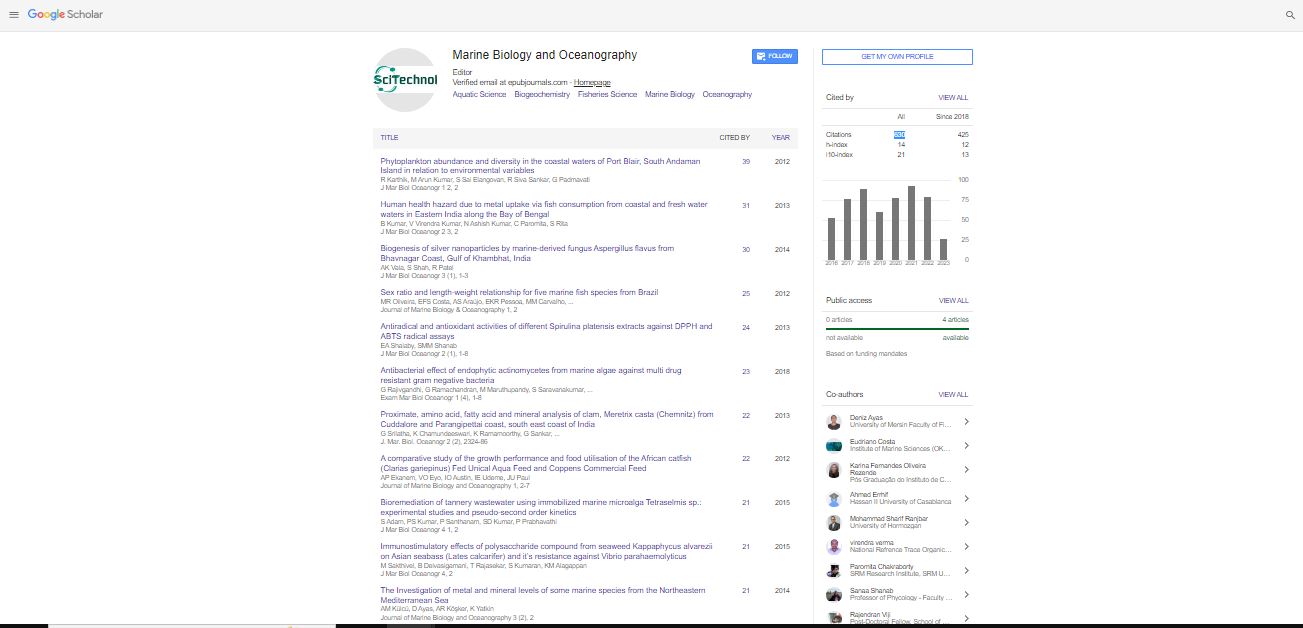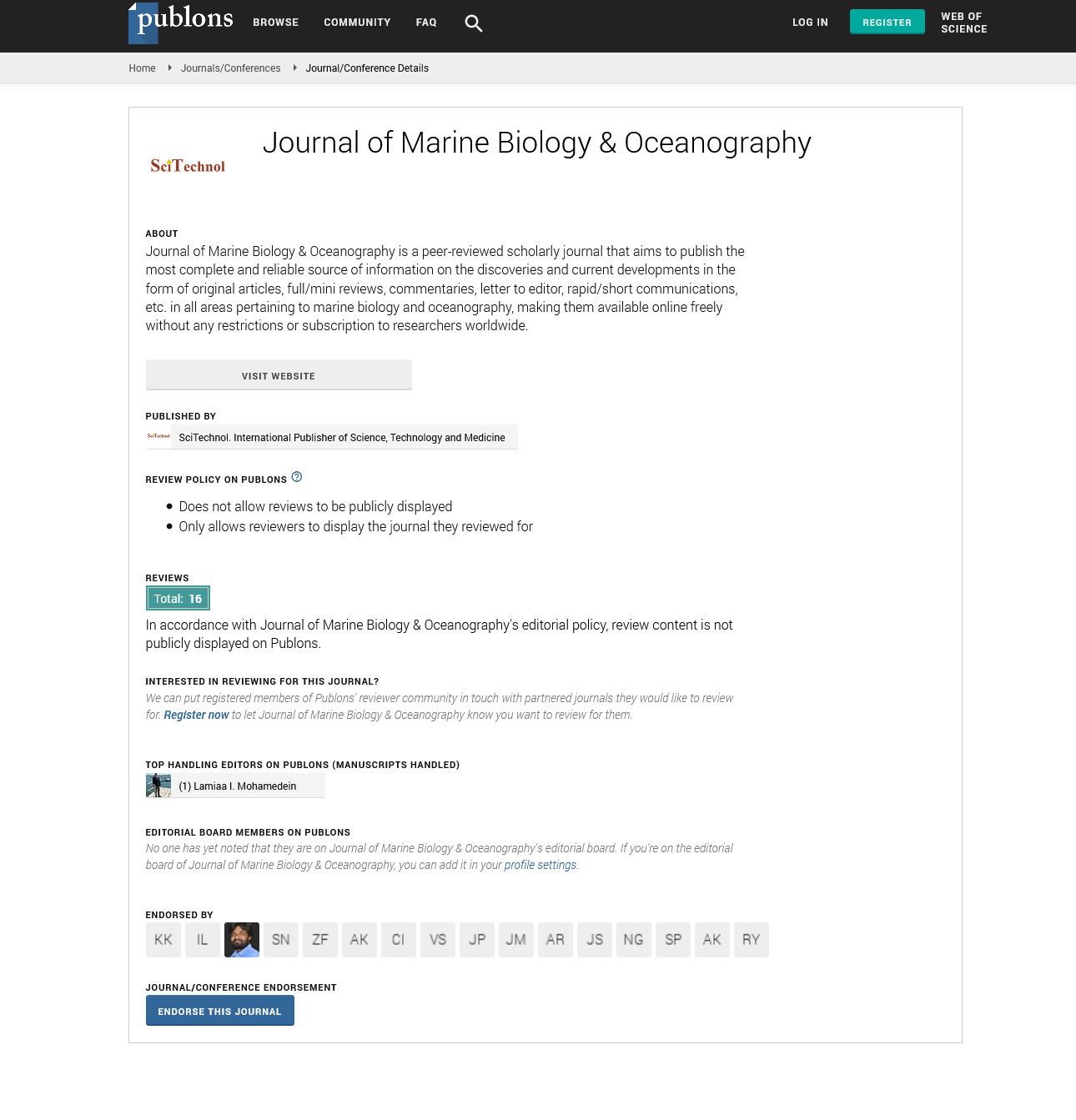Perspective, J Mar Biol Oceanogr Vol: 12 Issue: 3
The Economic and Environmental importance of Aquaculture
Erik Sterio*
1Department of Aquaculture and Fisheries, University of Ilorin, Ilorin, Nigeria
*Corresponding Author: Erik Sterio,
Department of Aquaculture and Fisheries,
University of Ilorin, Ilorin, Nigeria
E-mail: erik_sterio@uin22.ng
Received date: 22 May, 2023, Manuscript No. JMBO-23-105090;
Editor assigned date: 25 May, 2023, PreQC No. JMBO-23-105090 (PQ);
Reviewed date: 08 June, 2023, QC No. JMBO-23-105090;
Revised date: 15 June, 2023, Manuscript No. JMBO-23-105090 (R);
Published date: 22 June, 2023, DOI: 10.4172/2324-8661.1000266
Citation: Sterio E (2023) Economic and Environmental Importance of Aquaculture. J Mar Biol Oceanogr 12:3.
Keywords: Sustainable aquaculture, shellfish, Biodiversity, marine ecosystems
Description
Aquaculture, the practice of cultivating aquatic organisms, has gained increasing attention in recent years due to its significant economic and environmental implications. As global populations continue to grow, the demand for seafood is skyrocketing, placing immense pressure on wild fish stocks. In this context, aquaculture emerges as a viable solution to meet the rising demand for seafood while minimizing the strain on natural ecosystems. From an economic standpoint, aquaculture provides numerous benefits. It provides employment opportunities in coastal and rural areas, contributing to poverty reduction and economic development. The industry supports a wide range of jobs, including hatchery operators, fish farmers, feed suppliers, processors, and exporters. Furthermore, aquaculture generates revenue through exports, enhancing international trade and foreign exchange earnings for countries that invest in this sector.
Aquaculture also plays an essential role in ensuring food security and reducing pressure on wild fish populations. By cultivating fish, shellfish, and other aquatic organisms, it provides a consistent and reliable source of protein for human consumption. With over 3 billion people relying on seafood as their primary protein source, the sustainable growth of aquaculture becomes imperative to meet nutritional needs. By alleviating the strain on wild fish stocks, aquaculture helps maintain biodiversity and ensure the preservation of marine ecosystems.
One of the environmental advantages of aquaculture lies in its potential to minimize overfishing and by catch. Overfishing has led to the depletion of several commercially important fish species, disrupting marine ecosystems and threatening their long-term sustainability. By cultivating fish in controlled environments, aquaculture helps relieve pressure on wild stocks, allowing them to recover and replenish. Moreover, aquaculture techniques can be tailored to reduce the incidental capture of non-target species, thus reducing the negative impacts associated with traditional fishing methods.
Sustainable aquaculture practices are also being developed to minimize environmental impacts. Efforts are being made to improve feed efficiency, reduce water usage, and enhance waste management. Innovations such as Recirculating Aquaculture Systems (RAS) are gaining traction, enabling efficient water and nutrient recycling while minimizing the release of waste into surrounding ecosystems. Integration of aquaculture with other sectors, such as agriculture and wastewater treatment, provides additional environmental benefits by utilizing products and reducing nutrient pollution.
However, it is important to acknowledge that aquaculture is not without challenges. Disease outbreaks, escapes of farmed species, and potential pollution from farms are some of the concerns that need to be addressed to ensure sustainable growth. Stringent regulations, improved biosecurity measures, and responsible farming practices are essential for mitigating these risks and safeguarding the environment.
To fully realize the potential of aquaculture, studies and development efforts are ongoing. Analysts are exploring new fish species, improving breeding techniques, and investigating alternative feeds to reduce reliance on wild fish stocks. Additionally, advancements in monitoring technologies, such as remote sensing and acoustic tagging, allow for better farm management, disease detection, and environmental monitoring. By cultivating fish and other aquatic organisms in controlled environments, aquaculture provides a sustainable alternative to traditional fishing practices, which often result in the depletion of fish stocks and ecological imbalances.
Conclusion
Aquaculture holds immense economic and environmental significance. It addresses the increasing demand for seafood, stimulates economic growth, and provides livelihood opportunities. By reducing pressure on wild fish stocks, it contributes to the preservation of marine ecosystems and promotes sustainable fishing practices. As the industry continues to evolve, embracing innovative technologies and adopting responsible practices will be essential for maximizing its potential and ensuring a thriving, resilient, and sustainable future for aquaculture.
 Spanish
Spanish  Chinese
Chinese  Russian
Russian  German
German  French
French  Japanese
Japanese  Portuguese
Portuguese  Hindi
Hindi 
